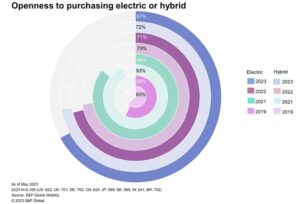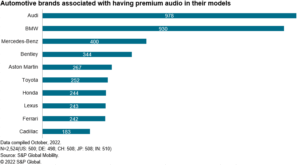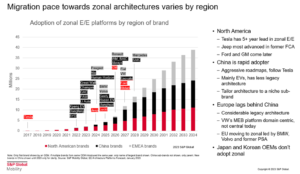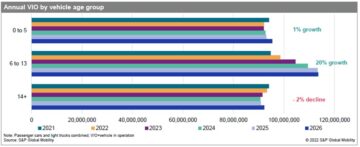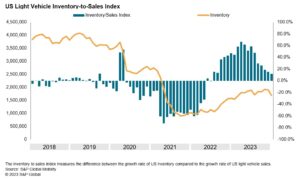The global semiconductor shortages are having a significant
impact on the automotive industries. It took a while to reach the
Medium and Heavy Commercial Vehicle (MHCV) sector, but the impacts
are now visible. The influence on production will be uneven across
OEMs and countries, with some seemingly unaffected. Several MHCV
OEMs will face constraints in the second quarter. Combined with
other supply-side challenges, these losses may net out as much as
3% of first-half 2021 production in some regions, including Europe
and North America. While IHS Markit believes the lingering effects
of the chip shortage may cast a shadow as late as 2022, we expect
that some of these first-half losses may be compensated for in the
second half of the year.
Europe
- In the first quarter, Volvo was the main affected OEM and
closed its plant in Ghent, Belgium, for one week leading to a
reduction of ca. 550 units. In the same period, employees of DAF
and Scania in the Netherlands went on strike for three days leading
to a reduction of ca. 1,050 units for both together. - In the second quarter, multiple OEMs announced constraints and
stoppages amounting to reductions of 6,000 to 10,000 vehicles. This
includes 2-4 week stoppages at the plants of Volvo and Renault
Trucks as well as Ford Otosan in Turkey that is anticipating its
vacation period from summer to 19 April to 13 June. Several other
OEMs are reducing their line rates and planning stoppage days. - There are also some OEMs that are faring better: Iveco has
increased its line rate in February and run extra Saturday shifts
in February and March and expects to increase its line rate further
by June. Although MAN is faced by the constraints, production in
the Polish plant increased. KamAZ announced its first-quarter
production figure at 9,800 units that is 400 units higher than the
company planned earlier.
Asia
- By and large, India, China and South Korea are not affected in
the MHCV sector by the chip shortage. Within the region, it’s again
the Volvo Group that is affected. Volvo’s UD Trucks brand sees
lower output at plants in Japan (reduction ca. 330 units) and
Thailand. [At the beginning of April, Volvo completed the
transaction of selling UD Trucks to Isuzu.]
Americas
- In Brazil, production stops accured at the end of March/
beginning of April due to a rise in Covid cases in the country and
the semiconductor shortage at Volvo. Both reasons led to a combined
loss of 3,100 to 3,400 units in the first half of 2021 which is
expected to be made up for later in the year as agribusiness
continues to strive and exports from Brazil are forecasted to
recover. (further details in our earlier article: Plant closures in
Brazil likely to cause only short-term impact on South American
production | IHS Markit) - In North America, there are several plant stoppages, reduced
line rates and production of unfinished trucks due to chip
shortage. Affected are Daimler (rolling downtime in two medium-duty
plants), Volvo Group, PACCAR (-3,000 units in Q1, that should be
recovered in H2). International did not comment on the topic and
Ford’s constraints seem to focus in the Light Vehicle sector.
Overall, the constraints are less than in the light vehicles
business. According to our semiconductor experts, the shortage was
made worse by special events in March (cold wave in Texas and fire
at the Renesas plant, in Japan) and will continue throughout the
4th quarter of 2021 in the Automotive sector. For Medium and Heavy
Commercial Vehicles, we assume that the OEMs have the potential to
recover part of the lost volume in the second half of 2021.
- america
- American
- announced
- April
- article
- automotive
- Belgium
- Brazil
- business
- cases
- Cause
- China
- chip
- closed
- commercial
- company
- continue
- continues
- countries
- Covid
- Daimler
- DID
- Director
- downtime
- employees
- Europe
- events
- expects
- experts
- exports
- Face
- Figure
- Fire
- First
- Focus
- Ford
- Global
- Group
- HTTPS
- Impact
- Including
- Increase
- india
- industries
- influence
- International
- IT
- Japan
- korea
- large
- leading
- Led
- light
- Line
- man
- March
- medium
- net
- Netherlands
- North
- north america
- Other
- planning
- plants
- Production
- Q1
- Rates
- reasons
- Recover
- research
- Run
- sees
- semiconductor
- Shadow
- shortages
- South
- South Korea
- summer
- texas
- Thailand
- the Netherlands
- transaction
- truck
- Trucks
- Turkey
- vehicle
- Vehicles
- volume
- volvo
- Wave
- week
- within
- year

